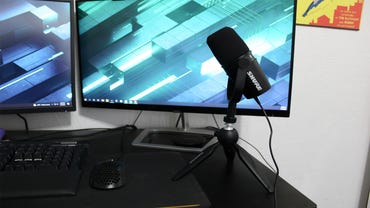Shure MV7 review: A hybrid microphone that adapts with you | ZDNet
Taylor Clemons/ZDNet
Whether you’re just getting started with a Twitch live stream or you’re a podcast veteran looking to upgrade your audio setup, the Shure MV7 microphone is a great choice. It features a hybrid USB and XLR connectivity scheme, which not only makes it beginner-friendly but able to adapt as your skills improve and needs change. The microphone retails for $224, though I highly suggest springing for the
mic/tripod bundle for $242
mic/boom arm bundle for $300
. Not only are these bundles a good value, they make initial setup a lot easier. The mic itself comes in black, silver, or red (though the red version costs a bit more: $269), so you can either have it blend into your studio decor or show off your personal style. It’s also plug-and-play compatible with both Windows and macOS computers, so no matter what you use to stream and record, you won’t have to worry about connectivity issues.
And if packaging is something you are either interested in or concerned about, the Shure MV7’s is fairly impressive when it comes to protecting your new mic and reducing frustration when unboxing. Every component is neatly separated by cardboard dividers and compartments, ensuring that they stay in place during shipping, which reduces the chances of something getting damaged. And there are also very few plastic bags inside the box, with just the tripod, boom arm adapter, and cables coming in their own bags.
This is great news for anyone looking to reduce their plastic waste or just not have a ton of tiny little bags to mess with when checking over your mic components when you first open up the box. Every bit of packaging seems to be recyclable as well, which was a relief for me because there are few things more annoying than having a box be full of stuff that is just going to end up in a landfill, like Styrofoam cubes, packing peanuts, or the weird kind of plastic that can’t be recycled. This is especially true since, at any given time, my office is full of things to be unboxed, reviewed, or repackaged and shipped back to manufacturers, and I loathe trying to fit what is essentially garbage back into a box. The outer box and warranty paperwork feature 12 different languages (English, Spanish, French, German, Italian, Portuguese, Russian, Japanese, Korean, Traditional Chinese, Chinese Simplified, and Arabic), so if English isn’t your first language, you can easily figure out the key features of the MV7 and register your new mic for the 2 year warranty. Unfortunately, the quick-start guide is only in English, so you may have to visit the online version and translate it yourself or do some digging online to find it in your preferred language.
Like
- XLR and USB connectivity
- Plug-and-play setup
- PC and Mac compatible
- Crisp, clean sound
Don’t Like
- Mic is quite heavy
- Pricey
- Has a bit of a learning curve
Setting Up
The microphone is one of the simplest I’ve ever had when it comes to initial setup. It comes with just about everything you need: USB-C to USB 3.0 as well as USB-C to USB-C cables, a boom arm adapter, and my review unit came bundled with the desk tripod. Unfortunately, it doesn’t come packaged with any sort of XLR cable if that is your preferred connection. But since the Shure MV7 is designed to be beginner-friendly, the absence of an XLR cable is forgivable; especially since anyone who uses an XLR setup for their audio probably already has at least one cable, and if not, they’re fairly inexpensive. The
AmazonBasics 6-foot XLR cable
is about $9, making it a great choice for anyone just starting out with XLR setups or recording and streaming pros who want an inexpensive backup connector cable.
The MV7 is on the larger side, when it comes to streaming microphones. It’s not quite as bulky as the
Shure SMB7
favored by many pro Twitch streamers and podcasters, but if you’re looking for an ultra-compact mic, this isn’t for you. I set the MV7 side-by-side with the
HyperX QuadCast S
for size comparison, and while the tripod makes the MV7 stand taller, without it the two mics are fairly similar in size. Which is to say: chonky. If you have a smaller desk or recording space, you’ll have to take that into account when looking to integrate the MV7 into your setup.
I was glad that the MV7 came packaged with a desk tripod, not only because it would help out first-time podcasters and streamers with setup, but because my boom arm (in a word) sucks. A few years ago, I’d bought a cheap, desk-mounted boom arm for the
Blue Yeti
mic I’d used for streaming on Twitch and chatting with friends via Discord. It does the job, but I wish that I had invested in a more expensive version since the weight of the Blue Yeti bent the boom arm, causing it to list to the side. And this causes all kinds of issues when it comes to positioning my microphone where I need it. The MV7 is also a hefty mic, weighing about 2 pounds; less than the Blue Yeti, but it still puts my poor, sad boom arm in a bad way.
The bundled tripod feels fairly solid, featuring a ball joint for angling the MV7 where you need it and articulating legs for adjusting height and stability. I do wish that the tripod legs articulated on more than one joint, like the
TalkWorks flexible tripod
, since it would be perfect for anyone who doesn’t have a lot of desk space or who has a tight setup and needs to mount the mic onto a computer monitor or light stand. However, it’s a great little tripod that doesn’t add a ton of weight to the mic when attached, making it easy to pick up and move around your desk or even hold on to if you’re recording audio on-location or shooting video while moving around a set. You could just hold onto the horseshoe bracket of the mic, but that gets uncomfortable after a while and forces you to hold the mic very close to your face which could cause muddled or clipped audio.
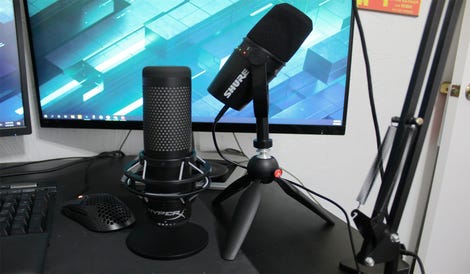
Taylor Clemons/ZDNet
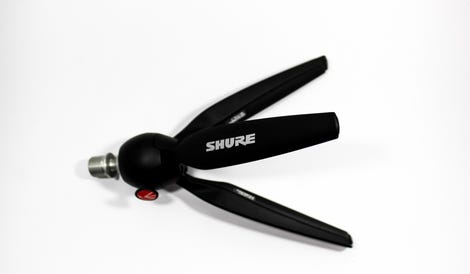
Taylor Clemons/ZDNet
Since I don’t have any sort of XLR mixing module, like the
Focusrite Scarlett Pro
, I wasn’t able to compare how easy initial setup would be compared to the USB connection. But since many newer modules support USB connectivity for PC and Mac computers, I suppose the difficulty would lie more in creating custom audio filters in your preferred streaming and recording software rather than in connecting hardware. The nice thing about the Shure MV7 is that if you do opt for the XLR connection, the microphone doesn’t require any sort of phantom power module; it draws power from your computer or preamp, making it a bit more intuitive than other, more expensive audio equipment.
Setting up the MV7 with a simple USB connection was about as easy as it gets: plug the USB-C connector into the mic and the USB 3.0 or other USB-C end into the computer, and once the computer recognizes the mic as an input device, you’re good to go. I did have to download the ShurePlus Motiv app in order to update the microphone’s firmware, but it was also a quick and simple process. You don’t have to have the app installed to use the microphone, but it does help out with tailoring the MV7’s pickup and EQ patterns to your space.
Also: Best streaming mic 2022: From Twitch to podcasts
ShurePlus Motiv app
As I said, the ShurePlus Motiv app isn’t strictly necessary to use the MV7 microphone with your computer, but if you want to get the most out of your mic without needing a degree in audio engineering, I highly recommend downloading it; the app is free and simple enough to use, even for beginners.
When you first open the app, you have to select the MV7 in the drop-down menu in order to do any sort of tweaking to EQ levels or pickup patterns. The cool thing about the Motiv app is that you can use it to create custom EQ settings for multiple Shure microphones at once, which is perfect for multi-person recording and streaming like interview-style podcasts or collaborative streams on Twitch. If you want to get started right away, all you need is the Auto Level tab in the app. This screen lets you set mic tone and where the mic is going to sit relative to you as well as adjust your monitoring mix, change the on-board LED behavior, and quickly mute your mic. The “dark” tone settings adds a bit of a bass boost to your audio while the “bright” setting emphasizes higher tones, making it a good choice for singers and musicians. The “natural” tone doesn’t add any sort of boost, leaving your audio in a raw state that’s better suited for conversations or anyone who prefers to clean up audio in post-production processes. The “near” and “far” configurations control how sensitive the microphone’s pickup modules are, which helps keep audio from either clipping or sounding too faint and muddled.
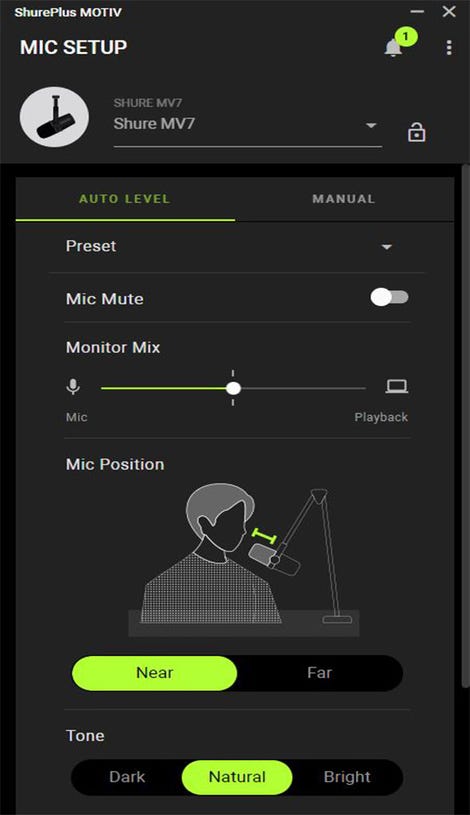
Taylor Clemons/ZDNet
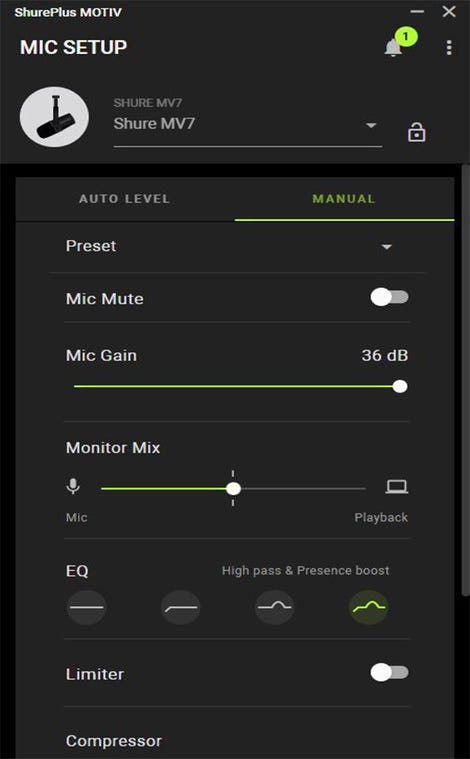
Taylor Clemons/ZDNet
The second tab is labeled “manual,” and it gives you a bit more control over how your audio will sound and how your microphone will behave. It’s in this tab that you can adjust gain levels, set a compressor filter, toggle a limiter filter on and off, and choose between four different EQ presets. Each of the EQ settings offers different signal processing options, letting you choose between recording or streaming raw, unprocessed audio, reducing the chances of audio clipping and distortion, emphasizing clarity, or creating a balance between clarity and gain. Personally, I love the High-pass presence boost setting, since that gave me the tone and quality I was looking for when I stream on Twitch (however rarely that is). And I switched to the Flat setting when just chatting with friends on Discord or in-game voice chat, since gain and audio richness didn’t matter so much in a casual setting. I also prefer to keep this mic on the “natural” tone setting, since that fit my voice the best, giving me crisp, clean audio without any “fuzz” from bass boosting or annoying whines that can come with prioritizing high tones.
You can even use the ShurePlus Motiv app to completely disable the mic’s on-board touch controls for muting and live monitoring. This is a great option for anyone who talks with their hands or wants to be able to adjust mic positioning while recording or streaming and not accidentally mute themselves or cut live monitoring.
Recording and live streaming
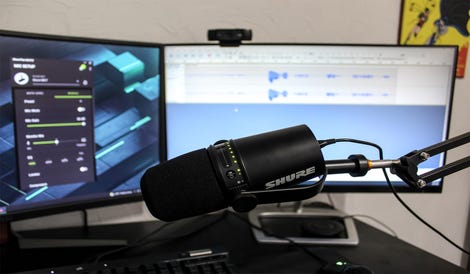
Taylor Clemons/ZDNet
The MV7 is a delight to use for both recording and live streaming. Once I got everything how I wanted it in the ShurePlus Motiv app, I really didn’t need to do a whole lot within either Streamlabs OBS or Audacity to get clean, clear audio. The pickup modules do an excellent job of singling out your voice or instrument and rejecting just about any background noise. There is also very, very little white noise “hiss” during dead air, which is not only annoying to work around and for an audience to listen to, it gives any recording or live stream an air of being amateur quality.
Within Streamlabs OBS, the only additional audio processing or filter I needed was a noise gate that further reduced the chances of random background noise being picked up by the microphone; which was very helpful for when my cats decided to body slam open my office door and scream-cry at me for shrimp treats mid-stream. The MV7 also did very well when recording music with Audacity, picking up clean, crisp sound with very little distortion or “fuzz” that needed to be cleaned up in post-production.
My office doesn’t have any sort of acoustic treatments like foam sound absorbers or bass traps, and I was concerned any recorded or live audio would have that odd, almost echo-y sound that happens in rooms without anything to absorb sound that bounces around the walls, floor, and ceiling. But I was pleasantly surprised to find that the audio had a studio-quality feel to it, sounding as though I had a professionally treated space even though I’m just some guy extolling the virtues of the Carmilla web series while playing
I’m on Observation Duty
to an audience of about 3 at any given time or noodling around on a beat-up 6-string acoustic guitar I bought for $10 at Goodwill 6 years ago. The on-board touch controls were also a godsend during streaming for quick-muting the mic or adjusting the monitoring mix, saving me the hassle of having to tab out of my game to fiddle with settings within the Motiv app or toggle the mute button on and off. They are a little finnicky though, so you may have to poke at the mute button two or three times before it actually cuts the mic.
Conclusions
If you’re an absolute newbie when it comes to recording or streaming, there are simpler, more budget-friendly options out there for USB microphones for you to cut your teeth on. However, the Shure MV7 is an almost perfect option for anyone who is just starting out and willing to invest a bit more money into a quality microphone for pro-quality audio. And with the XLR connection option, this microphone is designed to adapt with you as your skills improve and audience grows; this makes the MV7 exceptionally valuable for smaller podcast productions that don’t have large equipment budgets or Twitch streamers who want a microphone that will last them for years to come. This microphone does have its downsides (it’s heavy and expensive), but they’re so small as to be almost negligible; and the intuitive design of both the microphone and companion app coupled with the plug-and-play USB connectivity far outweigh any limitations you may find.
For all the latest Technology News Click Here
For the latest news and updates, follow us on Google News.

